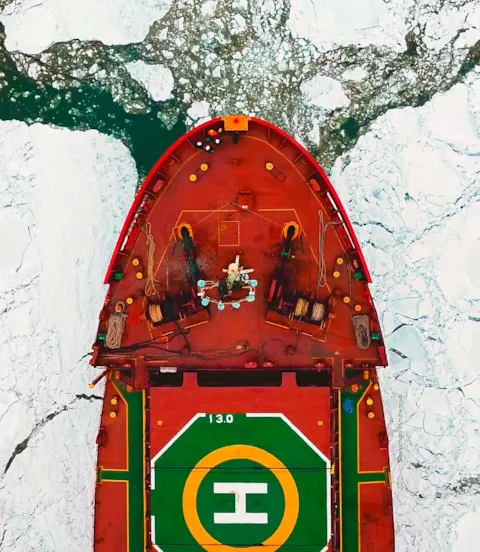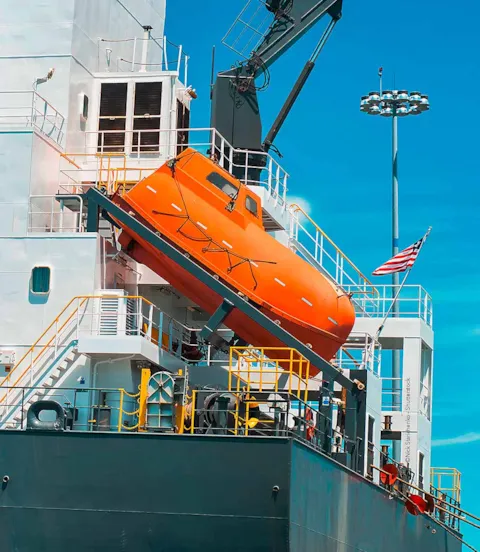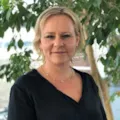A proactive approach for safety
Safety is what the regulatory work of IMO and classification societies is all about. A set of draft guidelines up for final voting at MSC 101 in June 2019 addresses a number of important concerns and reflects a new regulation philosophy that promises more flexibility.
While in the past, IMO and other regulatory bodies typically issued regulations in response to incidents, the trend today is to be proactive while pursuing a goal-based regulatory approach that defines what should be achieved, rather than how to achieve it. This provides flexibility for designers to reap the full benefits of advanced technology. A number of IMO draft Guidelines, which are subject to approval by MSC 101 in June 2019 and will likely enter into force on 1 January 2024, take this approach:

Safety of lifting appliances and mooring operations
To reduce damage, injuries and fatalities resulting from mechanical failure of lifting appliances on board ships, IMO is developing appropriate mandatory requirements for inclusion in SOLAS. The draft requirements are prescriptive and refer to class standards for the design, construction and testing and to industry standards for operational testing, inspection, operation and maintenance of lifting appliances with capacity above a safe working load of 1,000 kg. The testing and inspection requirements will probably be retroactive.Mooring operations involve equally hazardous activities. IMO has therefore reviewed and amended the relevant SOLAS requirements and drafted new and revised guidelines for new ships; the inspection and maintenance requirements for mooring equipment, including lines, are expected to be applied retroactively.

Safety-relevant equipment in polar waters
The Polar Code, in force since 2017, was just the beginning: IMO has developed recommendations for navigation and communication equipment as well as for life-saving appliances for ships operating in polar waters. The new Guidance document for navigation and communication equipment addresses environmental factors such as polar temperatures, mechanical shock testing to withstand ice breaking situations, ice accretion and battery performances in cold temperatures. The Guidelines for life-saving appliances and arrangements (LSA) outline recommendations for mitigating hazards based on assessment criteria such as maximum expected time of rescue, operation at polar service temperatures, operation in ice, ice accretion of life-saving appliances and arrangements, the effect of operation in high latitudes, operation in extended periods of darkness and the possibility of abandonment into ice or land. It should be noted that the recommendations to carry additional clothing, survival equipment and water may affect the capacity of the survival craft. However, the actual capacity adjustment, if any, would be dependent on factors such as insulation and heating of the LSA.

Safety of ro-ro passenger ships
Two IMO proposals address potential hazards on board ro-ro and similar motor vehicle-carrying vessels: a regulatory amendment says openings to ventilation systems for closed spaces must be considered as flooding points in stability calculations because the ventilation must run continuously when vehicles are on board, and ventilation openings must therefore remain open.
To address fire risks on ro-ro decks of passenger ships, typically associated with reefer units and electrical systems, IMO has agreed on draft interim guidelines detailing operational measures and recommendations for the design of fire safety systems on board new ro-ro passenger ships, such as enhanced fire detection technology, CCTV and non-open ro-ro decks. Vessels with DNV GL additional class notation F (A, M, C), 2018 or later are already in line with this best practice.
Owners and ship operators are encouraged to review their ro-ro passenger ships with open vehicle decks or weather decks to make sure there is a sufficient distance between permanent openings and the survival craft.

Onshore power supply
To protect residents of port cities and coastal regions from ship exhaust gas emissions, authorities increasingly require the use of shore power when ships are in port. IMO is developing guidelines for safe operation of onshore power and is considering potential regulatory amendments. Specific technical requirements will be left to the relevant instruments.
Flexibility in design of life-saving appliances
The IMO draft amendments to the guidelines on alternative design and arrangements for SOLAS Chapter II-1 and III (MSC.1/Circ.1212) will allow life-saving appliances and arrangements to deviate from prescriptive requirements, provided an equivalent level of safety is achieved and the intent of the SOLAS requirements are met. IMO defines goals, functional requirements and expected performance criteria providing flexibility in the design of alternative and innovative life-saving appliances.

Ventilation of survival craft
An entirely different set of conditions complicate rescue operations at high outside temperatures: in a totally enclosed lifeboat full of people, conditions can quickly become unbearable. IMO has therefore developed ventilation requirements for survival craft to reduce the risk of overheating and high CO2 concentrations, proposing a minimum ventilation rate of 5 m3/hour/person, respectively and that CO2 concentrations are not to exceed 5,000 ppm. These amendments to the LSA Code will apply to all cargo and passenger ships.

Watertight integrity
IMO has reviewed the SOLAS design criteria for watertight integrity for consistency with the probabilistic damage stability approach introduced in 2009. A proposed amendment addressing watertight doors and other elements reflects the introduction of safety centres and stability computers in passenger ships and aims to better cover all watertight boundaries on or above the bulkhead deck in passenger ships.
DNV GL recommends to monitor the outcome of MSC 101 in June 2019 and to prepare for implementation of approved amendments to mandatory IMO instruments accordingly. DNV GL will also inform subscribed customers through our Regulatory and Technical newsletters about the outcome of MSC 101.

Kathrine Ilje Nerland
Senior Principal Engineer
